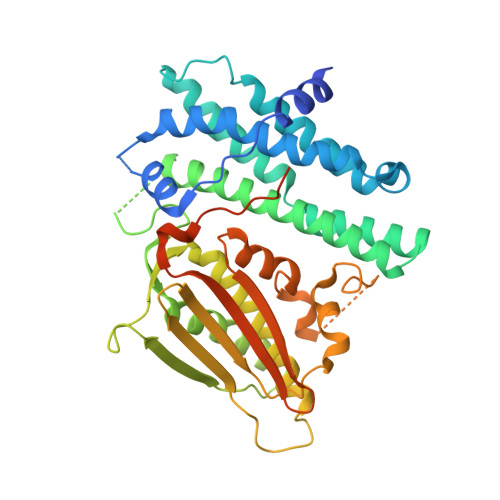VER-246608, a novel pan-isoform ATP competitive inhibitor of pyruvate dehydrogenase kinase, disrupts Warburg metabolism and induces context-dependent cytostasis in cancer cells.
Moore, J.D., Staniszewska, A., Shaw, T., D'Alessandro, J., Davis, B., Surgenor, A., Baker, L., Matassova, N., Murray, J., Macias, A., Brough, P., Wood, M., Mahon, P.C.(2014) Oncotarget 5: 12862-12876
- PubMed: 25404640
- DOI: https://doi.org/10.18632/oncotarget.2656
- Primary Citation of Related Structures:
4V25, 4V26 - PubMed Abstract:
Pyruvate dehydrogenase kinase (PDK) is a pivotal enzyme in cellular energy metabolism that has previously been implicated in cancer through both RNAi based studies and clinical correlations with poor prognosis in several cancer types. Here, we report the discovery of a novel and selective ATP competitive pan-isoform inhibitor of PDK, VER-246608. Consistent with a PDK mediated MOA, VER-246608 increased pyruvate dehydrogenase complex (PDC) activity, oxygen consumption and attenuated glycolytic activity. However, these effects were only observed under D-glucose-depleted conditions and required almost complete ablation of PDC E1α subunit phosphorylation. VER-246608 was weakly anti-proliferative to cancer cells in standard culture media; however, depletion of either serum or combined D-glucose/L-glutamine resulted in enhanced cellular potency. Furthermore, this condition-selective cytostatic effect correlated with reduced intracellular pyruvate levels and an attenuated compensatory response involving deamination of L-alanine. In addition, VER-246608 was found to potentiate the activity of doxorubicin. In contrast, the lipoamide site inhibitor, Nov3r, demonstrated sub-maximal inhibition of PDK activity and no evidence of cellular activity. These studies suggest that PDK inhibition may be effective under the nutrient-depleted conditions found in the tumour microenvironment and that combination treatments should be explored to reveal the full potential of this therapeutic strategy.
Organizational Affiliation:
Vernalis (R&D) Ltd, Granta Park, Cambridge, UK. Current address: Horizon discovery, Cambridge Research Park, Waterbeach, Cambridge, UK.

















